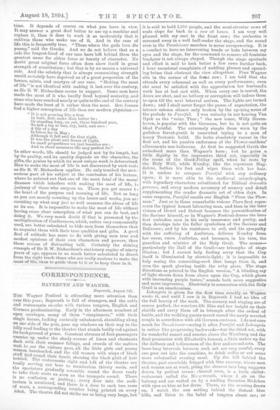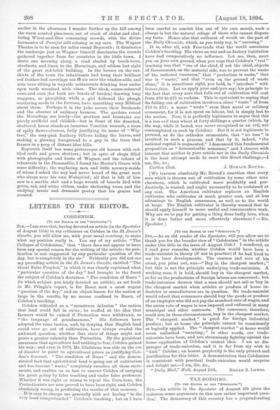CORRESPONDENCE.
BAYREUTH AND WAGNER.
Bayreuth, August 7th. THE Wagner Festival is attracting more attention than over this year ; Bayreuth is full of strangers, and the cafes -and restaurants re-echo with various tongues, English and German predominating. Early in the afternoon numbers of .open carriages, many of them " einspanners, with their single horses, looking curiously unbalanced, shambling along on one side of the pole, pass my windows on their way to the hilly road leading to the theatre that stands boldly red against its background of pines. Constant streams of foot-passengers saunter up under the shady avenue of limes and chestnuts dark with their summer foliage, and crowds of the natives -wait to see the visitors pass, all the little girls and young women bareheaded, and the old women with wisps of black stuff tied round their heads showing the black plait of hair behind. The restaurants right and left of the theatre are busily serving out beer to numberless thirsty souls, and -the spectators gradually assemble round the doors ready to take their seats as soon as the trumpets sound. There is no confusion or jostling ; every door into the audi- torium is numbered, and there is a door to each two rows of seats, a corresponding number being printed on every soket. The theatre did not strike me as being very large, but it is said to hold 1,650 people, and the semi-circular rows of seats slope far back to a row of boxes. I am very well pleased with my seat in the front row ; the orchestra is screened away in a well half-under the stage, and the sound even in the Tannhauser marches is never overpowering. It is a comfort to have no intervening heads or hats between my eyes and the stage, for the command to remove all feminine headgear is not always obeyed. Though the stage spectacle and effect is said to look better a few rows further back, I hear occasional complaints of nodding plumes and spread- ing brims that obstruct the view altogether. Frau Wagner sits in the corner of the freat row ; I am told that she attends every rehearsal as well as every performance ; even she must be satisfied with the appreciation her husband's work has at last met with. When every one is seated, the doors are shut, and no bribery or corruption will induce them to open till the next interval arrives. The lights are turned down ; and I shall never forgot the pause of expectation, the intense solemn silence only broken by the opening notes of the prelude to Parsifal. I was unlucky in not hearing Van Dyck as the " reine Thor ; " the new tenor, Willy Birren- koven, is popular with the Germans, but he is not quite an ideal Parsifal. The extremely simple dress worn by the guileless forest-youth is somewhat trying to a man of heavy Teutonic build. He looks absolutely vacant in the first act, and his passive endurance of the Flower-maidens' allurements was ludicrous. At first he suggested Gurth the swineherd more than Wagner's hero ; but he gains a. little dignity in the impressive third act, especially in the scene of the Good-Friday spell, when he rests by the Holy Well, while Kundry, like the repentant Mag- dalene, bathes his feet and wipes them with her hair. It is useless to compare Parsifal with any ordinary opera ; it is more akin to the medimval miracle-plays, with legendary characters substituted for Biblical dramatis persona, and every modern accessory of scenery and detail supplementing the cruder dramatic art of olden days. In some respects, Parsifal recalls our English "Piers the Plow- man." Just as in those remarkable visions Piers first repre- sents the typical honest labouring man, and then in the later visions of Dowel and Dobest becomes the personification of the Saviour himself, so in Wagner's Festival-drama the hero first embodies man in his early innocence and purity, and then develops into the fuller symbolism of the Saviour and Deliverer; and by his resistance to evil, and his sympathy with the suffering of Amfortas, delivers Kundry from her curse, cures Amfortas, and becomes, in his turn, the guardian and minister of the Holy Grail. The scenes— particularly the Hall of the Grail—are triumphs of stage illusion ; but I cannot help feeling sorry that the Cup itself is illuminated by electric-light ; it is impossible to help seeing the connecting-cord that hangs from it, and even the spark glowing inside the ruby glass. The stage directions as printed in the English version, " A blinding ray of light shoots down from above upon the Cup, which glows with increasing purple lustre," sounds both more suggestive and more impressive. Electricity in connection with the Holy Grail is an anachronism.
Lohengrin is given for the first time exactly as Wagner wrote it, and until I saw it in Bayreuth I had no idea of the full beauty of the work. The scenery and staging are of course perfect, the warriors lift Elsa and her knight on their shields and carry them off in triumph after the ordeal of battle, and the wedding guests march round the newly married couple in accordance with old German customs. I do not care much for Tamiliduser—seeing it after Parsifal and Lohengrin is rather like progressing backwards—but the third act, with its wonderful sunset and sunrise above the Wartburg and the final procession with Elizabeth's funeral, a little makes up for the dullness and tediousness of the first and second acts. The hour-long intervals between each act are very restful, every one goes out into the sunshine, to drink coffee or eat some more substantial evening meal. Up the hill behind men d mthe theatre, past cornfields fringed with blue succory, where and women are at work, piling the sheaves into long waggons drawn by patient cream- oloured oxen, is a little chalet- restaurant called the Bill gerreuth, where I sit on the balcony and am waited on by a smiling Bavarian Madchen with eyes as blue as her dress. There, as the evening draws on, I watch the sun setting behind the distant blue hills, and listen to the babel of tongues about me; or earlier in the afternoon I wander further up the hill among the warm scented pine-trees, out of reach of &Met and chat- tering Wiirst-and-Bier consuming crowds, with the divine harmonies of Parsifal still echoing in my ears. The Wagner Theatre is to be seen for miles round Bayreuth ; it dominates the landscape just as Wagner himself dominates the crowds gathered together from far countries in the little town. drove one morning along a road shaded by beech-trees, chestnuts, and limes to the Hermitage, and seldom lost sight of the great red-brick building. In the houses on the out- skirts of the town the inhabitants had hung their brilliant red feather-bed coverings out tt air over the window-sills, and men were sitting in wayside restaurants drinking beer under open roofs wreathed with vines. The sleek, cream-coloured cows and oxen (for both are beasts of burden) drawing long waggons, or ploughing while a girl followed the plough scattering seeds in the farrows, have something very Biblical about them. Perhaps it is the yoke across their foreheads and the absence of ordinary harness. The gardens round the Hermitage are lovely—the grottoes and fountains are purely artificial and childish—but in front of the deserted, shuttered house stands an immense Venetian sumach, a mass of spiky flower-clusters, fully justifying its name of "Wig- tree," the rosy-pink feathery billows hiding the leaves, and making a glowing foreground to a gap in the trees that frames in a peep of distant blue hills.
Bayreuth itself has some picturesque old houses with red- tiled roofs and green shutters ; but in spite of shops filled with photographs and busts of Wagner, and the echoes of rehearsals in the Dammallee, I found the Master's Grave with some difficulty; the wayfaring men and little nursery-maids of whom I asked the way had never heard of the great man who sleeps near his own Wahnfried; all that is left of him now is a marble slab and a huge wreath of laurels tied with green, red, and white ribbon, under sheltering trees, and the undying music and dramatic poetry that his genius had created.



































 Previous page
Previous page